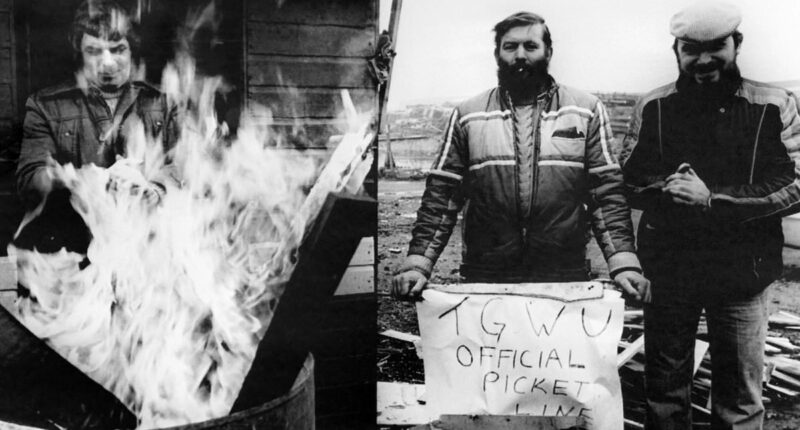Share this @internewscast.com
During a recent discussion, a prominent economist warned of a potential economic scenario reminiscent of the crisis in September 1976 for Britain.
In that year, Chancellor Denis Healey’s plans were disrupted when he had to forgo his flight to Washington for the International Monetary Fund (IMF) meeting, due to a severe financial emergency that required his immediate attention back at the Treasury. The pound was plummeting, and the global investment funds that finance governments had begun increasing borrowing costs.
Labor, under pressure from its left-wing faction, refused to alter its economic strategy, leaving Britain financially crippled, which forced the IMF, the world’s ultimate financial backstop, to intervene.
Crisis
The challenges the government currently faces are strikingly similar. Professor Jagjit Chadha, a distinguished Cambridge scholar and former director of the National Institute for Economic and Social Research, noted, ‘The UK’s fiscal situation mirrors that which led to the 1976 IMF intervention—we’re in dire straits. While I’m not declaring an inevitable IMF bailout, it has certainly become a serious possibility.’
The thought of a UK economic rescue by the IMF seems like a relic of the past. Aren’t such interventions meant for unstable regimes, distant developing countries, or economically volatile states like Greece?
However, following prolonged periods of excessive borrowing and expenditure that began with the Conservatives and escalated under Labour, the UK is now perceived as less financially stable than not only Spain and Italy but also Greece.
The British state now pays more than 5.5 per cent a year to borrow money over 30 years – way higher than 4.8 per cent at the height of the so-called ‘mini-budget crisis’ under the short-lived premiership of Liz Truss in the autumn of 2022.
And while government borrowing costs have risen elsewhere over recent years, the UK’s 5.5 per cent rate is now far more than the 4.9 per cent in the US and the average of 3.7 per cent across the eurozone (Greece is 4.3 per cent).
Meanwhile, Britain has easily the highest inflation across the G7 group of industrialised nations – hitting an 18-month high of 3.8 per cent last month.

The then chancellor Denis Healey was forced to abandon his G&T in the VIP lounge at Heathrow and, instead of taking a flight to Washington, to attend the annual meeting of the International Monetary Fund (IMF)
Thanks to this big-spending, big-borrowing government, our 30-year gilt yield is now at its highest level since 1998. The difference is that, back then, the government was paying interest on a national debt that was only 36 per cent of national income.
That figure is now almost 100 per cent of GDP – after a decade of lax fiscal management under the Tories, the ruinous impact of Covid-related lockdown and a year of Labour making the situation even worse.
That’s why, with the highest borrowing costs in over a quarter of a century now applying to a much bigger debt, the government is spending over £100billion on interest payments each year – more than twice what we spend on defence.
And this is why financial markets are so worried, because Labour won’t countenance spending cuts – their only answer is to keep raising taxes and borrowing.
Yet Chancellor Rachel Reeves’ £25 billion annual hike in employer national insurance contributions has led to a plunge in hiring. Her increase in capital gains tax rates has seen revenues fall, just as more punitive measures against international investors based in the UK has seen them up sticks.
In other words, far from fixing our public finances, Labour’s tax-raising instincts are causing the economy to slow down even more. And when growth is low or the economy actually shrinks (as during April and May), government spending on benefits and other support measures rises just as its revenues get weaker, leading to an even higher budget deficit.
Back in 1976, the Washington-based financial watchdog demanded deep public spending cuts in return for bailing out the UK, and across-the-board pay restraint.
Unemployment soared, private investment fled and, as inflation spiked, the resulting plunge in living standards unleashed industrial anarchy, with endless protests and strikes culminating in the 1979 ‘winter of discontent’. It’s not beyond the bounds of possibility that we will experience something similar sooner than we think.

Should other parties back deep spending cuts, supporting Sir Keir Starmer in getting them through Parliament?
The future path of the UK now depends crucially on Labour’s upcoming Autumn Budget. Many economists think that to plug the hole in our public finances, Reeves will be forced to break Labour’s manifesto commitment not to raise income tax, employee national insurance or VAT in a bid to calm bond markets.
Haywire
But I’d say the greater danger is that, with the UK’s tax burden already at a 70-year high, higher tax rates may crush enterprise and investment so much they result in even less tax revenue – which would send financial markets haywire.
This is why financial markets and foreign governments – not least the US – will be watching Reeves’ pronouncements very closely.
Gilt yields rose sharply in the aftermath of her high-tax-high-spend ‘Halloween Budget’ – and, unless there is a very clear demonstration of fiscal discipline, not least serious spending constraints, then global investors could well do the same thing this autumn, taking matters into their own hands.
If that happened, as government borrowing costs escalated, the pound would plunge – pushing inflation up further via higher import prices, causing creditors to demand even higher interest on UK state borrowing.
Caught in this ‘debt ratchet’, Reeves would then be forced to seek external assistance to meet the government’s obligations, with debt interest payments likely to be prioritised over benefit spending, to try to maintain at least some access to external credit. Everyone from pensioners to the unemployed could suffer.
The US – which is the largest funder of the IMF – would likely take a dim view of Labour’s big-state tendencies, putting the White House on collision course with a multitude of Starmer’s backbenchers.

Unemployment soared and private investment fled with endless protests and strikes culminating in the 1979 ‘winter of discontent’
Toxic
The public-sector pay restraint and state hiring clampdown demanded by the IMF, as in 1976, would be fiercely resisted by many Labour MPs, putting Starmer and Reeves – if she hasn’t been sacked by then – in an almost impossible position.
The Tories, Reform and other parties would face a choice. Should they back deep spending cuts, supporting Starmer in getting them through Parliament, defying many of the Prime Minister’s own backbenchers?
They would then be seen by much of the electorate as the ‘grown-ups in the room’, politicians who understand financial realities.
But, again, raw party politics could prevail. For if the Tories and Reform don’t back IMF-imposed spending restraints, Labour would be in danger, despite the massive majority it won little more than a year ago, of losing a ‘vote of no confidence’ – as incensed Labour backbenchers rid the party of Starmer in a bid to crown a leader from the far-Left.
It’s a toxic brew – and the warnings of economists such as Jagjit Chadha are just the start of what I fear will be a period of economic carnage in this country and significant political unrest.
That’s why 2026 could well be a re-run of 1976 – only with different music. As the last IMF crisis unfolded, Elton John and Kiki Dee’s Don’t Go Breaking My Heart spent six weeks at number one.
Denis Healey broke everyone’s heart then, and Rachel Reeves shows every sign of doing the same 49 years later.
















